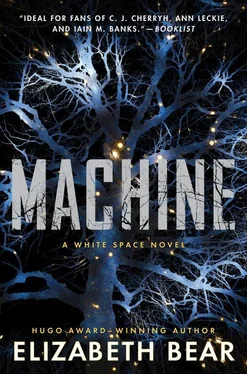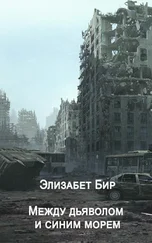This far out and on this side of the hospital, they would all be carbon dioxide or other compatible metabolisms if they weren’t ox types like me, and they would all be species who could tolerate a certain amount of grav and rads. But that was where the resemblances between them would end. I could make out lights intended to mimic the illumination of a dozen suns without turning my head. Soft gold and pink were, to me, the most appealing, followed by the glow my eyes—being adapted to it—saw as a pleasant, neutral white. There were other colors—by my standards worse colors—actinic or merely unpleasant.
We ox breathers shared our habitat sector with not only the carbon dioxide metabolisms, but with a couple of weirdies who breathed nitrogen as well. (No, I don’t know how you use nitrogen as an energy catalyst: I’ve got enough to do keeping track of the various oxygen metabolisms I come in contact with daily.)
The section admin I was craning my head so far back to look up at was one of the CO 2breathers, albeit one without any lungs. Core Gen’s administrator for my bio type, as well as allied and complementary bio types, was a really, really, really big tree.
_____
They might not have been the biggest tree in the galaxy. But then again, they might. They were a Vnetheshallan, from Shhele, and hospital rumor claimed they had come to the Core as a mere seedling. Their people, as a race, were mobile and vaguely humanoid in appearance in their younger instars. As they aged and became ready to reproduce, they returned to their homeworld, where they put down roots—literally—and generated seeds and offspring. And wrote a lot of poetry, created what their species considered great art, and so on.
All except for this one, who had put down roots right here. Or put up roots, or put in roots perhaps, because if you considered the direction of growth, their roots went toward the center of Core Gen and their leaves reached out, filtering light from all these endless stars to feed their hungry cells.
They had grown through and into the superstructure of the hospital. In a real sense, their body was Core Gen. Or at least a significant chunk of Core Gen, ox sector. (Carbon diox sector, from its point of view.)
Job security, I supposed.
I was apprehensive going in, to be perfectly honest. I’d never had an easy conversation with the being most of us jokingly referred to as the Administree. Their nervous system was not centralized into anything we mammals would recognize as a brain, and their thought processes were not linear in a sense most humans would recognize, but ran in multiple parallel tracks at once. Talking to them always made me feel like I was having an argument with a ball of coked-out snakes.
I mean, in a good way. But still.
“Hello, Administrator Starlight,” I said. “You wanted to see me?”
The tree’s name was not pronounceable, but it translated as Grows-in-Starlight, which was pretty and accurate. I knew that their fox would translate for them as mine translated for me. When they replied, their “voice” came through the senso clearly.
[Doctor/Coordinator Jens,] said Starlight. [Can you explain your professional choices to us?]
“You believe I made the wrong choice in staying on Big Rock Candy Mountain when Tsosie wanted to fall back?”
[Perhaps. Do you?]
“I’ve reviewed the ayatanas, mine and Tsosie’s. I can’t be certain, quite honestly. I believe I made a choice that worked out as well as any choice could have, under the circumstances.”
[You don’t think that contact with atavistic humans was an unnecessary risk?]
My species’s premodern behavior has left us with something of a reputation, I’m afraid. “I was wearing some vintage ayatanas—”
[And their information didn’t convince you to leave?]
They weren’t unrightminded humans, and Starlight knew it. They were calling my bluff.
Starlight didn’t have eyes, per se. So I wasn’t quite sure how it was that I felt them studying me. Perhaps vast branches bent subliminally toward me as they focused their attention. Perhaps I was merely self-conscious as all get-out.
“That’s not what you want me to defend, is it?”
[You are capable of self-criticism,] they said. [That is good.]
Well, if the military taught us anything, it was how to accept discipline and how to accept praise. Often at the same time.
It was a skill that I saw coming in handy right now. I nodded to accept the compliment, if it was a compliment. You could never be sure. Starlight’s senso would translate the gesture for them as a form of human communication. Whether they understood me any better than I understood them—well, who could tell?
After a few moments, as if to see if I would fill the silence, Starlight said, [You brought a weapon into this hospital.]
Helen? Were they talking about Helen? The machine?
I would presume they were. If I had misunderstood, we could backtrack. I had come to understand that Starlight’s seeming aggression and rapid-fire sequences of contextless questions weren’t intended to give offense. It was just… how Starlight communicated.
I said, “Helen? A person. A patient. I brought a patient into a hospital. That’s what hospitals are for.”
Starlight seemed not to notice my indignation. It’s hard to tell, when dealing with really alien systers, what they do or do not comprehend about any communication, even if it’s translated for them. And the frustration, naturally, flows both ways. It’s hard to translate experiences outside of context.
The Administree said, [It’s a threat.]
I still wasn’t sure if they were talking about Helen, but they hadn’t contradicted me. “So are a lot of things we handle here. The machine is a person in need of healing. Should I have turned her away?”
[You also brought crew members of an unknown vessel, and a vessel that had met with an unknown accident, back with you.]
“We can help them, too. And you—well, the hospital, the Synarche, anyway— sent me to get them.” I paused and thought. “You could have refused us docking privileges.”
[We considered it.]
Ouch. “It was a weird trip,” I said.
[Be that as it may. She wants you as a care liaison.]
“She… what?”
[Helen wants you to be her liaison. Apparently she trusts you.]
I did not have time to be anybody’s care liaison. One of the physical symptoms of panic to certain members of my species is a coppery taste, if you were wondering. “Is she ready to be released on her own recognizance?”
[Dr. Zhiruo offered her an uncorrupted, air-gapped space within the Core General architecture in which to rebuild and update her personality modules under Dr. Zhiruo’s supervision and with her help. Dr. Zhiruo says she’s already more integrated. She’s going to bring in the hospital archinformist as well, to work with integrating the machine once Helen is stable. Messages will be going out to the other archinformists serving on I Rise From Ancestral Night at the site of the generation ship. So, no, she’s not ready to be released. But it’s Dr. Zhiruo’s professional opinion that it is safe to let her observe the care of her crew, and start integrating her into society.]
“I’m not qualified to be a care liaison.”
[Technically,] they said, with a pedantic tone that carried even across senso translation, [you’re extremely overqualified to be a care liaison. But the job should not be a problem for you. Which is good, because we are dealing with a dual first-contact situation. A form thereof, anyway. Helen’s encountered Terran humans before, but not the Synarche. And her crew, if any of them live, might as well be aliens.]
Читать дальше












